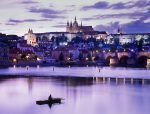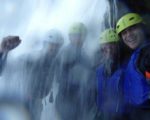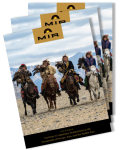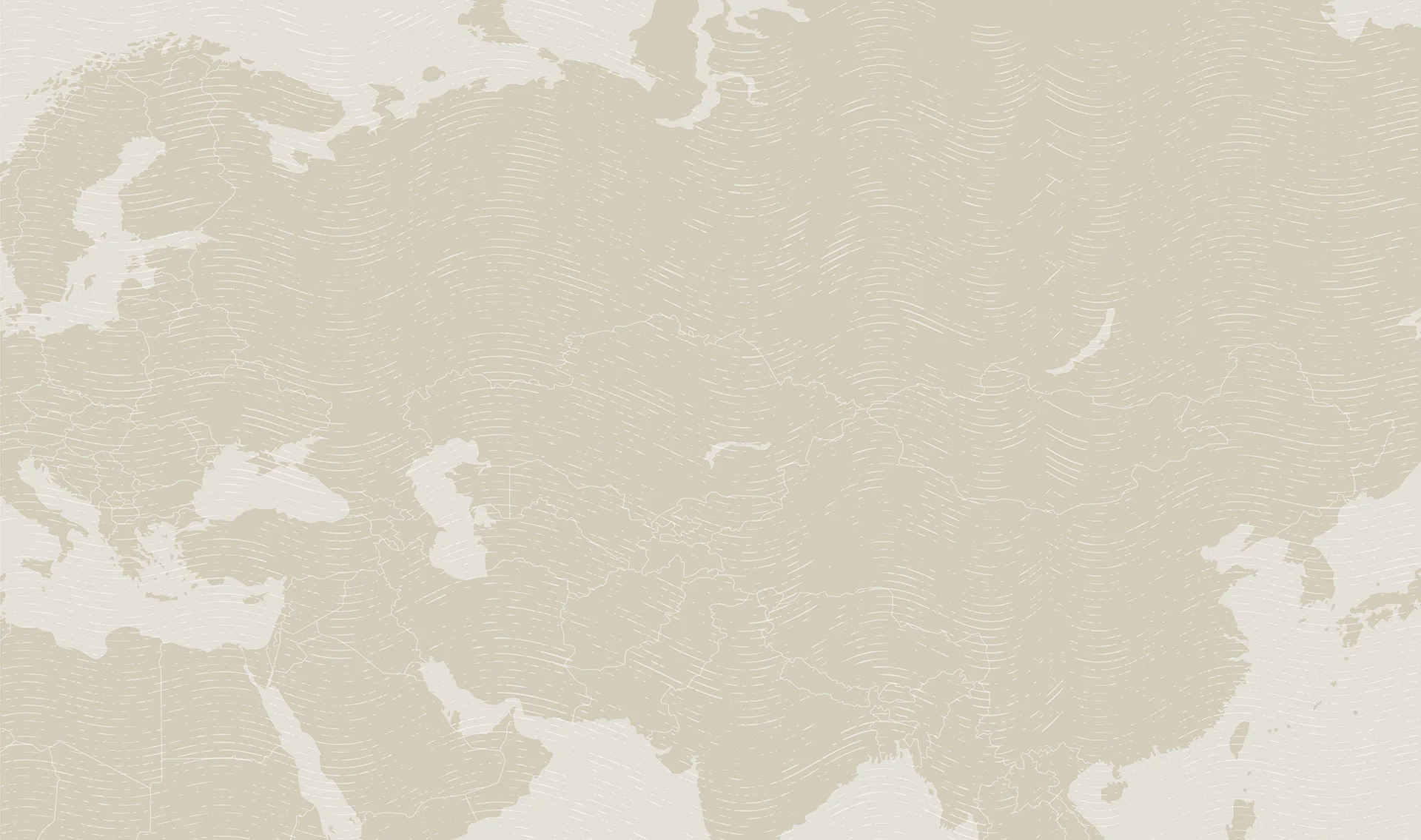Essential Central Europe
Photo credit: Olga & Ray Hayes
Highlights of Czech Republic, Slovakia & Hungary
Overview
Hidden from view for much of the 20th century, the hip and historic countries of Czech Republic, Slovakia, and Hungary boast gorgeous countryside, handsome churches and city centers, warm people, and almost 30 UNESCO World Heritage Sites combined. On this 8-day overland journey, relish in the medieval masterpieces, baroque architecture, sophisticated museums, and up-to-the-minute cultural life of three extraordinary European capitals — Prague, Bratislava, and Budapest.
Travels to: Czech Republic, Hungary, Slovakia

Map
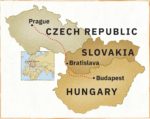
Itinerary
-
Days 1-3: Prague (Czech Republic)

Called the “Hundred-Spired City,” Prague’s beautifully-preserved Gothic, Baroque, and Neoclassical churches and palaces make it one of the great cities of Europe. Explore the UNESCO-listed city including Prague Castle, which began in the 9th century as a walled hill-fort; the Lobkowicz Palace, belonging to the noble Lobkowicz family, renowned for their patronage of Beethoven; the Charles Bridge, with its 30 Baroque statues; and the immense Gothic Tyn Church, with its tall spires built during the 14th-16th centuries.
Learn about the rich Jewish heritage of Prague with a walking tour of the Jewish Quarter. Pay your respects at the Old Jewish Cemetery, with 12 layers of graves and more than 12,000 gravestones. Visit the Gothic Old-New Synagogue, completed in 1270; the Spanish Synagogue, designed in a Moorish style; the Klaus Synagogue, built in honor of a 1573 visit from Emperor Maximillian II; and the Jewish Museum, displaying artifacts from synagogues and homes saved from the Nazis.
HIGHLIGHTS
- Prague, capital of Czech Republic, called the “Hundred-Spired City”
- Prague Castle, the largest ancient castle in the world, and the Old Royal Palace, the oldest part of the castle complex
- Little St. George’s Basilica, originally founded in 920
- Lobkowicz Palace at Prague Castle, recently returned to an American-born scion of the family, William Lobkowicz
- Golden Lane, a row of tiny 16th century houses within the territory of Prague Castle
- The 14th century Charles (Karel) Bridge, designed by King Karel’s architect, connecting Prague Castle to the Old Town
- Tyn Church, the most important church of the 15th century Hussites
- The Estates Theater, built in 1783, the place where Mozart premiered his opera, Don Giovanni
- The Jewish Quarter, Josefov, with Prague’s Old Jewish Cemetery, the Gothic Old-New Synagogue, and the Pinkas Synagogue, made into a memorial to the Jews of Bohemia and Moravia, with their names inscribed on its walls
-
Days 4-5: Bratislava (Slovakia)

Catch the train to Bratislava, capital of Slovakia situated on both sides of the Danube River. An introduction includes the city’s most important places such as the National Theater, the modern city center, and the Primate’s Palace. Enjoy fantastic views from Bratislava Castle and from the high ground of Devin Castle, an ancient stronghold of the Celts, Romans, and Slavs above the confluence of the Danube and the Morava Rivers. Take a walking tour of the squares, courtyards, and lanes of the Old Town, visiting Michael’s Gate, the Opera House, St. Martin’s Cathedral, and the Old Town Hall.
HIGHLIGHTS
- Devin Castle, ancient stronghold of the Celts, Romans, and Slavs
- Michael’s Gate, one of Bratislava’s oldest buildings
- Late 18th century Mirbach Palace, now an art gallery
- Palffy Palace, location of the first public concert by six-year-old Mozart
- Bratislava Castle, a 1950s reconstruction of 15th century defensive additions and Maria-Therese’s renovations in the 18th century
-
Days 6-8: Budapest (Hungary)

Take the train along the Danube to Budapest, capital of Hungary, built in the grand style of the Hapsburgs. Tour the highlights of this art nouveau city, including the monumental Parliament Building, built from 1880 to 1902. This neo-Gothic extravaganza features spires, courtyards, sculptures, frescoes, a 16-sided 96-meter rotunda, and 88 pounds of gold leaf. Visit the Church of Our Lady, commonly known as Matthias Church, originally built in 1255. Admire the city from the mock-medieval Fisherman’s Bastion, providing the most beautiful views in town. Soak in the hot mineral pools, take a plunge into the cold pool, and enjoy spa treatments at the famous Gellert Spa and Baths.
HIGHLIGHTS
- Budapest, capital of Hungary, with fine Baroque, Neoclassical, and Art Nouveau buildings
- Parliament Building, the largest parliament building in the world at the time of its completion
- Matthias Church, where King Matthias Corvinus had both of his royal weddings
- Seven-towered limestone Fisherman’s Bastion, with beautiful views over the city
- Jewish Quarter, with the Dohaney Street Synagogue and its Jewish Museum
- Gellert Spa and Baths, a magnificent art nouveau thermal spa opened in 1918
Dates & Prices
Please note:
- Private trip prices vary by season and are subject to hotel availability for your travel dates.
- Listed prices below are based on double occupancy and a 2 traveler minimum.
- Hotel upgrades, additional nights, and solo traveler prices are available on request.
Land tour price, per person, starting from:
-
2025 Dates
Available: January - DecemberTour, double occupancy$3,895Single supplement$795
What's Included
-
Tour Includes
- Accommodations per the itinerary. All room types, even in upgraded properties, are standard entry-level doubles or twins; please call for room category upgrade pricing and information.
- Meals, as noted in the itinerary: 7 breakfasts. Lunches and dinners are left free to allow independent exploration.
- Restaurant tips for included meals.
- One arrival and one departure airport transfer. (Additional arrival and departure transfers available at additional cost.) MIR will arrange for travelers to be met upon arrival and seen off on departure, whether we make your air arrangements or not.
- Ground transportation throughout itinerary by private vehicle (size of vehicle depends on number of travelers in your group).
- Guided sightseeing tours and entrance fees as outlined in itinerary.
- Services of experienced, English-speaking local guides, drivers, and other staff.
- Complete pre-departure electronic document that includes detailed packing suggestions, reading list links, country-specific information, maps, travel tips and more.
- Assistance booking your custom flight arrangements (on request; please note that international airfare is not included in the land tour cost).
- Electronic final update bulletin, with any late news, updates and important information.
-
Not Included
- International airfare or taxes/fuel surcharges.
- Meals not specified as included in the itinerary.
- Single supplement charge, if requested or required.
- Baggage handling.
- Items of a personal nature (phone calls, email, laundry, alcohol, excess baggage, etc).
- Gratuities to local guides and drivers.
- Visa/passport fees, airport departure fees.
- Expenses incurred as a result of delay, modification or extension of a tour due to causes beyond MIR’s control.
- Travel and trip cancellation insurance.
Activity Level
-
Level 2: Moderate, but Customizable
Level 2: Moderate, but Customizable
This ‘Essential’ itinerary, which is designed for private travel, features long days walking and standing, and some possibly long days in the touring vehicle. Only those fit to travel and who accept the local conditions should consider joining this program.
There is a significant amount of touring on foot, and those travelers planning to take the program as written should be able to walk one to two miles a day comfortably. Footing can be an issue and travelers should be able to negotiate cobblestones, uneven surfaces (possibly steep and/or wet), and deal with situations without handrails or ramps. In the hotels, you may find that showers/baths have steep steps up or ledges, which can become slippery and require extra caution. Some attractions are only accessible via steep staircases. Museums and hotels may not have elevators.
Past travelers have also encountered challenges with plumbing, bureaucratic service, variety of locally available foods, and availability and quality of public restrooms.
Accommodations in the basic program are generally three- to four-star hotels, some quite small with basic amenities and services. Upgrades may be available, please call for details.
